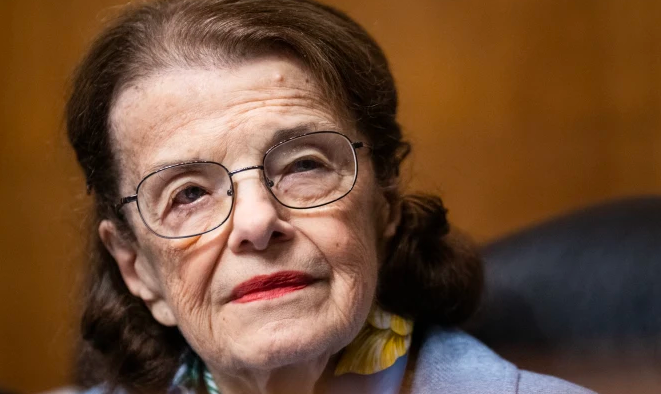Sen. Dianne Feinstein of California has died. She was 90 years old. Her office announced this on Friday.
She had been a Democrat in the Senate since 1992 and was the oldest member. It was longer that she stayed in her seat than any other woman or senator from California.
She died at her home in Washington, D.C., on Thursday night.
“There are few women who can be called senator, chairman, mayor, wife, mom and grandmother. Senator Feinstein was a force of nature who made an incredible impact on our country and her home state,” her chief of staff, James Sauls, said in a statement.
Feinstein’s death ends a political career that pushed the limits for more than fifty years and was full of major congressional wins on issues like gun control and the environment.
But in her last few years, Feinstein’s health and memory problems became more obvious. Because of this, she had a fight with other Democrats over her failure to step down.
At the end of her current term in January 2025, she planned to step down.
After Feinstein’s death, Gov. Gavin Newsom will have to choose a temporary replacement. There are three strong Democrats running for the seat: Barbara Lee, Katie Porter, and Adam Schiff.
Newsom in a statement called Feinstein “a political giant, whose tenacity was matched by her grace.”
“She broke down barriers and glass ceilings, but never lost her belief in the spirit of political cooperation,” he said. “There is simply nobody who possessed the poise, gravitas, and fierceness of Dianne Feinstein.”
Newsom said he and his wife, Jennifer Siebel Newsom, “are deeply saddened by her passing, and we will mourn with her family in this difficult time.”
Senate Majority Leader Chuck Schumer, D-N.Y., said on the chamber floor, “We lost a giant in the Senate.”
“Today, there are 25 women serving in this chamber, and every one of them will admit they stand on Dianne’s shoulders,” he said.
Rep. Nancy Pelosi of California, the former speaker of the House, grew emotional as she told reporters, “It’s a very sad day for all of us.”
“May she rest in peace,” Pelosi said.
President Joe Biden, who served with Feinstein for decades in the Senate, said in a statement, “She had an immense impact on younger female leaders for whom she generously opened doors.”
“Dianne was tough, sharp, always prepared, and never pulled a punch, but she was also a kind and loyal friend, and that’s what Jill and I will miss the most,” Biden said.
From the office of Senator Dianne Feinstein: pic.twitter.com/rvcAmVk8O0
— Senator Dianne Feinstein (@SenFeinstein) September 29, 2023
Feinstein, who was born and raised in San Francisco, paved the way for women to get into politics and run for office.
Before she became president of San Francisco’s Board of Supervisors in 1978, she ran for mayor twice but lost. She was the first woman to hold that position.
In the fall of that year, when former board member Dan White assassinated then-Mayor George Moscone and Harvey Milk, a coworker on the board of supervisors, Feinstein was named acting mayor.
In later talks, Feinstein talked about how she found Milk’s body and put her finger in a bullet hole to check for a pulse.
Feinstein was the first person to tell the news about the killings. When she was sworn in a week later, she became the first woman to lead San Francisco as mayor.
She was traumatized by the killings for many years.
“I never really talk about this,” Feinstein said with a sigh when asked about the killings during a 2017 CNN interview.
At the national level, she kept up her run of firsts.
She ran for governor but lost in 1990. But she won a special election for the U.S. Senate in 1992 and became the first woman from California to hold a place there.
After a few weeks, Barbara Boxer was sworn in as a senator. This made California the first state with two women in the Senate at the same time.
In what was called the “Year of the Woman,” four Democratic women were elected to the Senate, making it more than twice as big in terms of the number of women in that body.
Feinstein finished some of her most important policy work in the Senate. She wrote and pushed for the 1994 assault weapons ban, which was a major law that continued her long-term work to make gun laws tighter.
The bill passed Congress and was signed by President Bill Clinton at the time, but it came with a lot of deals, such as a 10-year sunset clause. The ban stopped in 2004, when George W. Bush was president.
She also pushed for laws to protect millions of acres of California’s desert, worked to set up a nationwide AMBER alert system, helped get the Violence Against Women Act renewed, and fought for the release of a long report that detailed the CIA’s torture methods, among other things.
For the 30 years she has been in the Senate, Feinstein has been seen as a moderate in her party. In the 1990s and 2000s, Feinstein was very popular because of that image. But in the years that followed, as California’s politics became more blue, she lost a lot of that popularity.
There was a lot of doubt about Feinstein’s mental health for the Senate as her centralism fell out of favor. This made her even less popular in her last few months in office.
A damning report from the San Francisco Chronicle in April 2022 featured unnamed Democratic colleagues of Feinstein fretting over her apparent decline in mental acuity. Feinstein defended her ability to govern, while acknowledging that she had been going through an “extremely painful and distracting” period as her late husband, financier Richard Blum, had battled cancer.
When Feinstein said she wouldn’t run for re-election when her term ended in 2024, many other Democrats had already started campaigns to take her place.













